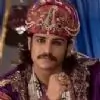This is a 4th BC period story. Please do not impose your contemporary morals or codes of conduct on it. I am not going into history at this point at all. The original Chandragupt was very ruthless and clinical in his destruction of the Nandas. There he had no serious personal reasons to defend his conduct or reason away his extreme hatred for the ruling family.
It was true that the Nandas were highly unpopular as a ruling dynasty. They sucked the people dry and filled their own coffers. They were least bothered about national security and people's welfare. They ruled on the basis of fear. They executed anyone with or without the least possible justification.
Chandragupt, according to history, just wanted to weed them out just like a farmer extinguishes pests and poisonous and thorny plants from his crop to save the crop from being destroyed. Even if you leave one such plant or pest, it will spread and destroy the whole crop. So he destroyed the entire Nanda race.
That was how kings and winners established and stabilized their rule. At least here, Chandragupt seems to have a solid personal reason for his hatred and his behavior. In the period we are taking about the personal was always political. The powerful oppressed the weak and there was only one way of making a big line smaller; that was drawing a bigger line beside it first and then try erasing the previous line. That was how empires were made.
Nand, Chandragupt, or for that matter any other king did not/would not extend any charity or mercy to the former ruling king or ruling family. It would be too dangerous for them. You talk about Chandra's cruelty to Nand in killing his own sons before his eyes and Nandini's eyes.
What about Nand having an affair with his queen and killing his own king when the latter trusts himself in his hands under the assumption that his barber has come to shave his beard? What will you call his Peeping Tom behavior at a pregnant Moora; some sort of social service? What about Suryagupt's murder before Moora's eyes?
Leave all that! This Nand killed 39 new born kids the day Chandra was born thinking that one of them must be Suryagupt and Moora's son. Similarly Nand and his nine sons cooly walk about murdering poor old men in the open court just because they have the temerity to question his injustice. Being Nandini's dad or brothers does not exculpate or atone for every sin they have committed. Nemesis and Karma catches up with everyone. It did with Nand and his sons.
I agree that Nandini and the women on this side will suffer a lot. Every war results in a lot of collateral damage; the woman, children, the aged, the families of the soldiers, etc. Any king would be cruel and ruthless to his enemies, with the traitors or with the previous king, his family, relatives, and even his faithful ministers.
Chandragupt was a great warrior, general, just and noble king to his people, and the founder of a mighty empire. It is nowhere written that he was a great humanitarian, altruist and peace lover. Politics and power in the BC were not for the chicken hearted and Chandragupt Maurya was one of the greatest brave heart warrior Indian soil has ever known.
No warrior worth his salt in those days would have such qualms for spilling their enemy's blood or be put off by all this gore. In a way I felt, the CVs were not exaggerating things or making Chandra cruel. I would rather see it as doing justice to the character description.
You might still feel that Nand being evil is no justification for Chandra being equally evil. This could be your opinion. In that case, no doubt you would equally condemn somebody in the military services of any country like the army, airforce, or navy of being murderers because they actually kill whoever comes in the line of their duty?
Similarly would you condemn an executioner who enforces and carries out the death sentence issued by our Supreme Court as the worst human being on earth for having no pity on his fellow human being? Going by the kind of logic you adopt, he should be the most miserable man on this planet.
Similarly, if we are going to take such considerations into account, I suppose we have to get the Bhagavad Gita banned. We a wear to this day in courts of law to say that whatever we are stating is the absolute truth. I suppose you would have a problem with that too as it was spoken on a field of battle inciting a soldier and warrior who wanted to run away to do battle and kill his enemies. Should we stop worshipping Lord Krishna because he not only supported war but many times also resorted to dubious means to achieve his ends in the battle of Kurukshetra?
Truth and dharma are very relative. We do have courts or police to seek justice in this age. So we can afford to speak all these morals. What about a period like Chandragupt's where the king was law himself and a bad, tyrannical king was at the helm of affairs? Your only option to restore justice or Dharma would have been to overthrow that king. Chandragupt and Chanakya did the same thing.
It at times pains when I see people talking about truth, dharma, right action and conduct in such an arbitrary fashion and sit over judgement of characters, people or their motivations at such a superficial level without realizing the underlying or deeper significance in them.
How easy isn't it to call somebody of Chanakya or Chandragupta's stature as cruel, obsessive, vindictive, demean or lessen their greatness of character just because the other person at the receiving end happens to be the father or brother of the female lead? It is enough if they are good fathers, brothers or husbands. Should all their other crimes be forgiven or overlooked because of that? I think not!
I have been very busy and should not have been replying at all. But I could not help it. So even if you are replying to this post, I will not be continuing this discussion or argument. I hope you understand.
Edited by shailusri1983 - 9 years ago


































